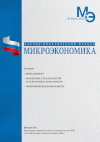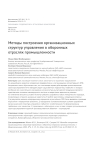Methods for building organizational management structures in defense industries
DOI: 10.33917/mic-6.107.2022.19-31
The purpose of this scientific article is to prepare proposals for the further development of the management of enterprises and organizations of the domestic defense industry. The relevance of the topic is due to the fact that at present the current organizational structure for managing them has a number of significant drawbacks, the main of which (especially with a significant expansion of the range of products) are a significant decrease in the system’s maneuverability and an increase in its response time to changes in external conditions. Therefore, it is necessary to develop new methodological approaches to eliminate these shortcomings. The paper considers the following issues: 1) as a result of the analysis of integration processes in the Russian defense industry, the main shortcomings and unresolved problems were identified; 2) the fundamental conditions for the development of an organizational structure for managing a business entity are determined; 3) requirements for its elements are formulated; 4) proposed and substantiated on their basis a typical organizational structure for managing a large production facility – a corporation.
References:
1. On the approval of the «Federal target program for the restructuring and conversion of the defense industry for 1996-2000». Decree of the Government of the Russian Federation No. 625 dated June 24, 1998. – Access from the Garant information and legal system.
2. Artyukhov V.I. Conversion of the defense industry in modern economic conditions // Conversion in mechanical engineering. 1994;1:5-9. (In Russ.).
3. Borisov V., Rassadin V., Tarakanov G. Prospects for structural changes in mechanical engineering and military-industrial complex // Economist. 1995;7:45-50. (In Russ.).
4. Bratukhin A.G., Dmitriev O.N., Kovalkov Yu.A. conversion potential. M.: Mashinostroenie, 1992. 453 p.
5. Pimenov V.V. State corporations as a tool for implementing industrial policy in the military-industrial complex // Management and business administration. 2008;4:56-65. (In Russ.).
6. Sobolev L.B. Restructuring of the military-industrial complex //Finance and credit. 2016;47:47-62. (In Russ.).
7. Sobolev L.B. Horizontal integration or conglomeration? //Economic analysis. 2013;24:8-12. (In Russ.).
8. Barinov V.A. Organizational design. Moscow: Infra-M. 2012. 384 p.
9. Kozyr N.S., Natapova S.M. Classification of organizational structures of enterprise management // Economics and management of innovative technologies. 2015. №3. URL: https://ekonomika.snauka.ru/2015//03/7493
10. Moshkina T. Many-sided structure // Personnel management. 2007;12:63-69. (In Russ.).
11. Zhdanova L.A. Organization and management of a capitalist firm. M.: Publication of the Peoples’ Friendship University, 1987. 82 p.
12. Betelin V.B. On the problem of diversification of production at the enterprises of the military-industrial complex of Russia // Innovations. 2018;7:3-7. (In Russ.).
13. Biryukov A.V. Cluster policy as a factor in increasing the competitiveness of defense industry enterprises // Microeconomics. 2009;5:70-75. (In Russ.).
14. Varshavsky A.E., Dubinina M.G. Synergy in the production of military and civilian products (on the example of the aviation industry) // National interests: priorities and security. 20017;13(1):20-33. (In Russ.).
15. Kashirin A.I., Baranov E.A., Kashirin P.A. Diversification and unique technological competencies // Innovations. 2019;1:18-25. (In Russ.).
16. Kolokolnikov O.G. Management of innovative processes based on the restructuring of enterprises for technological systems // Innovations. 2007;1:91-95. (In Russ.).
17. Mishin Yu.V., Kosterev N.B., Sukharev V.B. Methods, procedures and tools for diversification of enterprises and organizations of the defense industry of Russia // MIR (Modernization. Innovations. Development). 2019;10(1):38-53. DOI: https //doi.ojrg/10.18184/2079-4665.2019.10.1.38-53.
18. Chemezov S.V., Volobuev P.A., Koptev Yu.I., Kashirin A.I. Diversification, competencies, problems and tasks. New opportunities //Innovations. 2017;4:3-26. (In Russ.).



